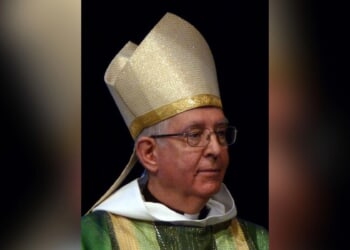John Bald is a former Ofsted inspector. He is Vice-President of the Conservative Education Society.
Sarah Vine’s How Not to Be a Political Wife is interesting about her relationship with her husband, Michael Gove – reader, he sulks – but is even more so about Gove’s relationship with Dominic Cummings, which was the reason I bought the book. Michael Gove’s tenure at the DfE has been a puzzle to me. I had just one private meeting with him, and found him thoughtful, careful and well-informed, in addition to his widely acknowledged reputation for good manners. I was, like all Conservatives, delighted that we had a Department for Education again, after Labour’s government by quango, dumbing down, destruction of the school inspection service, top-heavy management, waste, fake qualifications, and the clumsy, multi-layered safety regime after the Soham murders, when one simple check should have been enough.
Things started well. The AS level examinations, which put teenagers through three high-stakes examinations in successive years were made optional, quangos and fake qualifications scrapped, Marxist indoctrination removed from teacher training, National Curriculum revised to get rid of political correctness, and education returned to its proper purposes, with Katharine Birbalsingh, the shining star of our 2010 conference, leading the way. Local authorities, never competent to run education services, were to be put in their place, the example of Mossbourne Community Academy, to which I had directed the front bench’s attention as soon as I joined the party, to be extended, and, all in all, education to be returned to its proper purpose, of teaching and learning rather than political engineering.
Then, slowly at first, but with increasing impetus, things began to go wrong. First, Ofsted. It seemed obvious that we would replace Labour’s biased, centralised tyranny with a return to the HMI standards established by Sir Michael Tomlinson before Labour forced him into retirement. The well-qualified and experienced inspection teams that had built a reputation for thorough and fair work, would surely be restored. Instead, Sir Michael Wilshaw, the pioneering headmaster of Mossbourne, was persuaded, we are told, by Michael Gove, to take over Labour’s system without any structural changes. Eventually, Labour’s unfairness was replaced by a Conservative variety, and integrated with the system of forcing schools to join academy chains, anticipated before the 2010 election, but only explicitly adopted later.
As academy chains began sacking Head Teachers to insert their own people, the regime came to resemble a reign of terror, with fear throughout the system and the threat of a guillotine – professional rather than physical – at the end of it. A series of scandals, notably that of Perry Beeches, visited by David Cameron and fêted at Party Conference, spread discontent well beyond the education sector. Some people had been put in charge of schools without knowledge, competence or even interest in education, and some Secretaries of State were so obviously unsuited to the work that it was an embarrassment to listen to them. Public money went into highly dubious approaches such as those of Rudolf Steiner, against which I warned directly, to no avail.
The National Curriculum, a safety net of basic skills, was effectively abolished in secondary schools at the same time as it was being revised. In short, what had started as a sensible and necessary programme of reform, had become a whirlpool. Conservatives had never enjoyed a majority of teachers’ votes, but support after the 2016 election fell below ten per cent, and last year, one survey had it below five per cent. Even as an outlier, this represents a massive electoral problem for the Conservative Party.
The origin of the decline and fall can be summed up in two words – Dominic Cummings. The issues continued well after he and Gove left the DfE, but it is clear from Sarah Vine’s account that Cummings, operating from a cubby hole in the Department, was behind every hasty, ill-considered, and damaging decision. When Cameron offered Gove the job on condition that he did not employ Cummings – “too divisive, and a trouble-maker” – Vine says he responded that this would be equivalent to divorcing her. Exactly what made this man’s impulsive and often scatterbrained notions so addictive to a man of Gove’s superior intellect is hard to work out. But Gove’s life at Oxford had been one of immediate stimulus. The talent that makes him an excellent journalist may well have attracted him to Cummings’ superficial brilliance, even as it led him into disastrous decisions. In my field, the worst was buying into a single, flawed idea of educational research, then setting up at huge expense a mega-quango, The Education Endowment Fund, and staffing it with Labour supporters. It is no accident that its latest director is now calling the shots at the DfE.
But it’s over. Cummings and Gove have the satisfaction of knowing that Labour has accepted their main policy objective, academy trusts; is not ditching phonics; and seems unlikely to bring back the AS examination. Katharine Birbalsingh, spotted by Gove through his assiduous reading of the internet, and rightly placed in the limelight, has given us the most successful state school in history, and could not have done so without him. That will be his monument. I have subscribed to The New Statesman.



![Former Bravo Star Charged After Violent Assault Using a Rock-Filled Sock in Tennessee Walmart [WATCH]](https://www.right2024.com/wp-content/uploads/2025/07/Former-Bravo-Star-Charged-After-Violent-Assault-Using-a-Rock-Filled-350x250.jpg)



![Illegal Alien Walked Free After Decapitating Woman, Abusing Corpse for Weeks [WATCH]](https://www.right2024.com/wp-content/uploads/2025/07/1753013138_Illegal-Alien-Walked-Free-After-Decapitating-Woman-Abusing-Corpse-for-350x250.jpg)
![NYC Man Snatches Child Off The Sidewalk, Parents Chase Him Down [WATCH]](https://www.right2024.com/wp-content/uploads/2025/07/NYC-Man-Snatches-Child-Off-The-Sidewalk-Parents-Chase-Him-350x250.jpg)
![Man Arrested After Screaming at Senators During Big Beautiful Bill Debate [WATCH]](https://www.right2024.com/wp-content/uploads/2025/06/Man-Arrested-After-Screaming-at-Senators-During-Big-Beautiful-Bill-350x250.jpg)
![Karoline Leavitt Levels CNN's Kaitlan Collins and Other Legacy Media Reporters [WATCH]](https://www.right2024.com/wp-content/uploads/2025/07/Karoline-Leavitt-Levels-CNNs-Kaitlan-Collins-and-Other-Legacy-Media-350x250.jpg)
![Leftists Lose Their Minds After Jason Kelce Celebrates Being an American [WATCH]](https://www.right2024.com/wp-content/uploads/2025/07/Leftists-Lose-Their-Minds-After-Jason-Kelce-Celebrates-Being-an-350x250.jpg)





